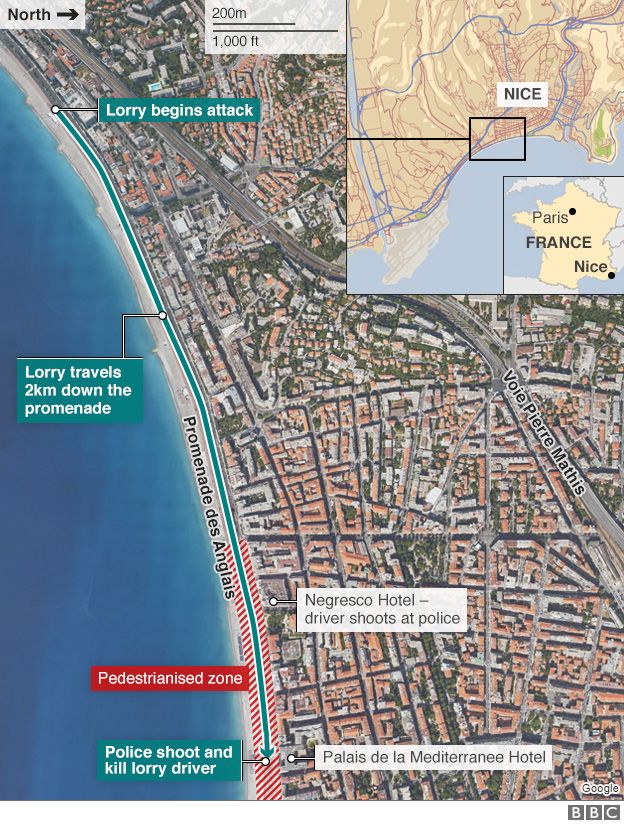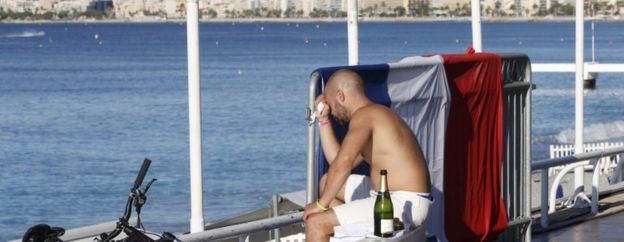- 3 minutes ago
- Europe
The driver of a lorry that killed 84 people in an attack in the French city of Nice has been confirmed as Tunisian Mohamed Lahouaiej-Bouhlel, 31.
Some 202 people were injured; 52 are critical, of whom 25 are on life support. Ten of the dead were children.
Prosecutor Francois Molins said Bouhlel had driven the lorry 2km (1.2 miles) along the Promenade des Anglais and fired at police before being shot dead.
Other weapons found inside the lorry were replicas or fake.
What the prosecutor said
Mr Molins said no group had admitted carrying out the attack but that it bore the hallmarks of jihadist terrorism.
Bouhlel drove the 19-tonne lorry into crowds celebrating Bastille Day at about 22:45 local time (20:45 GMT). He fired at officers with a 7.65mm calibre automatic pistol when the vehicle was close to the Negresco hotel and continued for another 300m, where his vehicle was stopped near the Palais de la Mediterranee hotel and he was shot dead.
Also found in the lorry were an ammunition magazine, a fake pistol, a replica Kalashnikov rifle, a replica M16 rifle and a dummy grenade.
There was also a bicycle, empty pallets, documents and a mobile phone. Items were later seized from Bouhlel's Nice home.
Bouhlel, a chauffeur and delivery man, was "totally unknown to intelligence services... and was never flagged for signs of radicalisation", Mr Molins said.
Bouhlel was divorced and his ex-wife has been taken into custody.
Warning: This story contains images some people may find distressing
 AFP
AFP- Follow the latest live updates
- What we know
- Bastille Day attack in pictures
- Social media reacts to attack
What has the president said?
Francois Hollande, who is in Nice, said the attack was of "an undeniable terrorist nature".
He said the battle against terrorism would be long, as France faced an enemy "that will continue to attack those people and those countries that count liberty as an essential value".
Mr Hollande said the attack was carried out "to satisfy the cruelty of an individual or possibly a group" and that many of the victims were foreigners and young children.
"We will overcome the suffering because we are a united France," he said.
A state of emergency, in place since November's Paris attacks carried out by militants from the so-called Islamic State group, in which 130 people died, has been extended by three months.
What witnesses saw
Simon Coates, a solicitor from Leeds told the BBC: "I saw one woman lying on the ground talking to her dead child, as other people desperately did what they could to save their loved ones.
"As the lorry passed by me a young boy of 10 or so just managed to leap to one side and escape by inches. Tragically dozens of those on foot, young and old alike, were not so lucky. Virtually everyone I saw on the promenade was either dead or beyond real help with truly terrible injuries."

Nader el-Shafei told the BBC he saw the driver face-to-face for about a minute: "He was very nervous… looking for something around him, I kept yelling at him and waving my hands to stop... he picked up his gun and started to shoot police."
Afterwards he said he ran towards the beach with others, fearing the driver, who was then shot by police, would detonate the lorry.
- Read more: Witnesses describe terror
Who were the victims?
Some 30,000 people were on the Promenade des Anglais at the time of the attack, officials said.
Tourists and residents of Nice were among those who died. They included two American citizens - a father and his 11-year-old son - a Ukrainian, a Russian and a Swiss woman.
The son of Fatima Charrihi said she was the first to die. He said she "practised Islam in the proper way. A real Islam, not the terrorists' version".
Fondation Lenval, the children's hospital in Nice, says it has treated some 50 children and adolescents, including two who died during or after surgery.
- Read more: Victims of Nice attack
Where now for "liberte"? BBC's Dan Johnson in Nice
 REUTERS
REUTERS
The president announced only on Tuesday that France planned to end its state of emergency soon. It will now be extended for another three months. That means police and soldiers on the streets, guarding key buildings. It means scanners and metal arches at some shops and regular bag searches. Gendarme reserves have been called up in support. There are already tighter checks at France's borders.
Security services have denied they relaxed after the Euro 2016 football tournament and there has been praise for the relentless job they have done in recent months and for the speed of their reaction last night in Nice.
Intelligence gathering has improved but predicting and preventing every attack is impossible. Some are questioning whether even a state of emergency is an effective level of response. The French are being warned they are going to have to live with terrorism. That means some big questions about the nature of "liberte" - one of the founding principles of this nation that people celebrated on Bastille Day.
What more do we know about the attacker?
Tunisian security sources said Bouhlel had been married with three children and came from the Tunisian town of Msaken. He visited Tunisia frequently, the last time eight months ago.
Justice Minister Jean-Jacques Urvoas said the suspect had been given a suspended sentence in May following a confrontation with another driver but this was his only conviction.
Residents of his apartment building said he was a loner who did not respond when they said hello.
- Read more: Who was the Nice attacker?
Response and reaction
- French Prime Minister Manuel Valls has declared three days of national mourning, starting from Saturday
- US President Barack Obama condemned the "horrific terrorist attack in Nice" and ordered flags on government buildings flown at half mast until 19 July
- UK Prime Minister Theresa May said she was "shocked and saddened by the horrifying attack in Nice"
- Nice's jazz festival has been cancelled and Marseille has announced it is cancelling a fireworks show planned for Friday evening
- The hashtag #PrayForNice is trending worldwide and in France#NousSommesUnis (we are united) is also trending
Timeline of terror: France's deadliest Islamist attacks
 AP
AP- June 2016 - man claiming allegiance to so-called Islamic State kills two police officials in Magnanville, near Paris
- November 2015 - multiple attacks on Paris by seven gunmen and suicide bombers kill 130 people and injure more than 350 in the deadliest terror attack in French history
- June 2015 - man with suspected links to Islamist radicals decapitates his boss after ramming his car into an area containing flammable liquids at factory in Lyon
- January 2015 - three days of attacks by gunmen in Paris leave 17 people dead, starting with an attack on the office of satirical magazine Charlie Hebdo and ending in two sieges
- March 2012 - a gunman kills seven in Toulouse and Montauban, including a teacher and three children at a Jewish school
Are you in Nice? Did you see what took place on Promenade des Anglais? If it is safe to do so, please get in touch. Email haveyoursay@bbc.co.uk
Please include a contact number if you are willing to speak to a BBC journalist. You can also contact us in the following ways:
- WhatsApp: +44 7525 900971
- Send pictures/video to yourpics@bbc.co.uk
- Upload your pictures / video here
- Tweet: @BBC_HaveYourSay
- Send an SMS or MMS to 61124 or +44 7624 800 100
Or use the form below

No comments:
Post a Comment